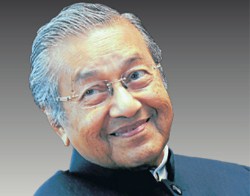by Jose Barrock & S Ashwiinie
 Premier
Najib Abdul Razak, comes across as a well-bred gentleman – he speaks
well, is very polished, always in pristine suits and the hint of a
clipped English accent adds to his allure.
Premier
Najib Abdul Razak, comes across as a well-bred gentleman – he speaks
well, is very polished, always in pristine suits and the hint of a
clipped English accent adds to his allure.
But
he wasn’t always this way, so polished— he has in the past played many
roles, an angry young man, the king maker, and many others, some of
which we at KiniBiz will explore.
Turn
back the clock, it’s October 1987— trendy Malaysians from all walks,
hang out at the Tin Mine Discotheque in the Kuala Lumpur Hilton, (now
the Crowne Plaza), the Bee Gee’s “You Win Again” is atop the charts,
while the late Michael Jackson’s “Bad” has just been released—ripping
speakers everywhere.
Despite the apparent calm in the streets, there were serious racial problems sprouting up in Malaysia.
An angry young man
The
appointment of non-Chinese educated personnel in Chinese schools
resulted in a gathering of some 2,000 odd Chinese led by the association
of Chinese school teachers and trustees or Dong Jiao Zong, in Kuala
Lumpur. This group was joined by politicians from the Malaysian Chinese
Association or MCA, Democratic Action Party known as DAP, Gerakan and
other Chinese associations and parties.
Politicians
from both sides of the divide—the MCA being the second largest member
of the ruling Barisan Nasional coalition, and opposition stalwarts
DAP—quickly charged up the crowd, racial slurs were made and a plan was
put in place to boycott Chinese schools.
Interestingly
enough Dong Jiong Zong and some of the other Chinese associations were
asking for the resignation of then Education Minister, Anwar Ibrahim.
This
occurred on October 11, 1987. Six days later— in retaliation—- a 34
year old Najib who was the head of UMNO Youth led a 10,000 strong rally,
in the TPCA (Tamilians Physical Cultural Association) Stadium in
Kampung Baru and is purported to have called for the Malays to bathe the
keris (a Malay dagger) in Chinese blood.
This
eventually led to Ops Lalang (weeding ops) on October 27, 1987— where
106 individuals were arrested under the Internal Security Act (ISA), and
two publications, The Star and Sin Chew Jit Poh’s had their publishing licenses revoked.
Najib however has denied this entire Chinese blood and keris episode, saying he never urged the unrest. “Many think that it is his cousin Hishammuddin (Hussein) who started the keris
brandishing and waving act at UMNO Youth gatherings….it was actually
Najib who started it… It’s an UMNO Youth thing,” a local politician, and
a Ketua Bahagian of UMNO said.
A seasoned politician at 34
“It
is like that…when you go for an MCA or DAP meeting they (the members)
are very racist as well, you think they are singing the praises of
Malays at their meetings?
“If
you go to an MIC meeting also it’s the same, but somehow when Malays do
anything it gets blown out of proportion,” the UMNO politician said.
While some may attribute the episode of Chinese blood and keris to Najib being young, the fact of the matter is at 34 years old, he already had plenty of experience in politics.
In
1976 when his father Abdul Razak passed away, Najib who was 23, was
selected to run for the Pekan parliamentary seat left vacant by his
father’s death. And of course he won.
His
first stint in the Cabinet was at the age of 25 when he was appointed
Deputy Minister of energy, telecommunications and post in 1978—making
him the youngest deputy minister in the country. He had a whole host of
ministerial portfolios from the age of 32.
Also
at the age of 29, he was Menteri Besar of Pahang, a position he held
for four years from 1982.Nevertheless some have also questioned who
Najib’s political mentors are. This question arises due to his closeness
to Anwar who he faces as the head of the opposition today in the 13th
General Elections.
Closeness to Anwar
Najib has had good ties to Anwar before. His position in 1987 as UMNO  Youth
head was a result of Anwar moving up the food chain, going for an UMNO
Vice President’s position, and thus nudging Najib up.
Youth
head was a result of Anwar moving up the food chain, going for an UMNO
Vice President’s position, and thus nudging Najib up.
 Youth
head was a result of Anwar moving up the food chain, going for an UMNO
Vice President’s position, and thus nudging Najib up.
Youth
head was a result of Anwar moving up the food chain, going for an UMNO
Vice President’s position, and thus nudging Najib up.
Interestingly
enough Najib was part of Anwar’s Team Wawasan in 1993, together with
Muhammad Muhd Taib and Muhyiddin Yassin. All three were UMNO Vice
Presidents, while Anwar strengthened his position to Deputy President of
UMNO, when incumbent Ghafar Baba withdrew from the fight for the number
two position.
Some
also say that Najib’s meagre 231 seat victory in Pekan in the 1999
General Elections was a result of many showing their unhappiness with
him supporting Premier Mahathir Mohamad, and parting ways with Anwar who
had since been sacked.
Najib plays kingmaker
There
was massive infighting in UMNO in 1987, and Najib was involved in the
thick of action. A year ago, in 1986, Musa Hitam the Deputy Premier
stepped down saying Mahathir no longer trusted him. Then in April of
1987, Tengku Razaleigh Hamzah and former deputy premier Musa Hitam took
on Mahathir and his Deputy Ghafar.
 Mahathir
won by a mere 43 vote majority—-garnering 761 votes while Razaleigh
managed 718 votes. A swing of a mere 22 votes would have altered
Malaysia’s history.
Mahathir
won by a mere 43 vote majority—-garnering 761 votes while Razaleigh
managed 718 votes. A swing of a mere 22 votes would have altered
Malaysia’s history.
Insiders
say, Najib had privately backed Razaleigh, but at the 11th hour he
switched camps to support Mahathir, giving the incumbent the win. They
add that Anwar had played an important role in turning Najib against
Razaleigh and Musa, and thus benefit Mahathir.
“I’m
sure many wonder what would have happened had Najib not switched
allegiances…Mahathir may not have won—Malaysian history would be very
different from what it is today,” a local politician said.
While
his political life panned out well in the early years, the later part
of it has been tumultuous to say the least, with accusations that he was
involved with a Mongolian model who was murdered.
Altantuya Shaariibuu’s murder
In
2006 the entire nation was shocked when details of Mongolian model
Altantuya Shaariibuu’s murder came about— especially the use of
explosive substances such as C4, which are close to impossible to get on
the open market, and the involvement of policemen who were assigned to
the Prime Minister as bodyguards.
Najib’s
aide and associate Abdul Razak Baginda was among those charged but was
later acquitted. The prosecution did not appeal. Stories circulated that
Altantunya was also known to Najib but Najib strenuously denied this.
Altantuya
and Razak Baginda, who were emotionally attached, were said to be
involved in an arms deal where Malaysia acquired Scorpene submarines
from France, with the latter making high commissions from the deal.
“When
you talk about arms deals there is a lot of secrecy, it’s all
classified under OSA (Official Secrets Act) so there are no questions
asked….it all falls under defence spending, so it’s easy money to be
made…some say the whole Altantuya fiasco, is a deal gone bad,” a
politician said.
Certain quarters have tried to link Rosmah Mansor— Najib’s wife to the murder, but there is no evidence to prove this.
Rosmah, an albatross around Najib’s neck
“In any political exchange, or discussion her name keeps coming up, and not in a flattering manner…earlier UMNO politicians defended her….now they don’t bother,” the politician said.
in a flattering manner…earlier UMNO politicians defended her….now they don’t bother,” the politician said.
 in a flattering manner…earlier UMNO politicians defended her….now they don’t bother,” the politician said.
in a flattering manner…earlier UMNO politicians defended her….now they don’t bother,” the politician said.
She
has been in the spotlight for all the wrong reasons. There is talk
about her being involved in decision making at the highest levels,
brokering deals, and living it up spending on accessories and jewellery.
Some
say she is also close to the likes of Desmond Lim’s wife Tan Kewi Yoon,
and steel magnate William Cheng’s wife Chelsea as well, explaining to a
certain extent why the two businessmen can’t seem to do any wrong in
corporate Malaysia.
Also
through the grapevine was her purported involvement in awarding of the
RM8 billion Gemas-Johor Bahru double tracking rail job.
As
one official from a public listed company said, “It’s very seldom that
almost the whole country is united against someone…strangely enough in
this case it’s the PM’s wife.”
Other issues—1MDB, FELDA
More
recently Najib’s 1Malaysia Development Bhd (1MDB) has hit the headlines
for all the wrong reasons. 1MDB has issued some RM20 billion worth of
bonds with very high coupon rates, but has little or nothing to show for
it. The company has come under fire.
Some
of its partners such as PetroSaudi International are just as opaque,
leaving many questions unanswered. Also 1MDB has come out to say that it
has RM7 billion in investments in the Cayman islands—- which is safe.
This has irked the investing community even more, as they wonder why the
money is not transferred back to Malaysia, and with some even
questioning why 1MDB was set up in the first place.
Meantime
there have been mixed reactions to the Felda Global Ventures Holdings
Bhd (FGV)’s floatation exercise, which was the second largest IPO after
Facebook last year, and raised some RM9.9 billion. According to certain
quarters the settlers, although they received cash, were given the
shorter end of the stick with the massive ownership dilution of the
company.
Profundo
Economic Research in a report released in June last year, prior to
FGV’s floatation exercise stated that, “Our analysis shows that an
accumulation of environmental, social and governance risks will result
in serious financial risks for investors.” It had an avoid call on FGV’s
stock.
Since
a surge to almost RM5.50 after its RM4.60 IPO, FGV’s stock has tapered
off and been largely trading below that for most of the the year.
Good deeds— too few and far in between?
The
UMNO politician said, “Who is the President of MIC (Malaysian Indian
Congress), who is the President of MCA (Malaysian Chinese
Association)….I tell you it’s all Najib….he’s the only hope for Barisan
Nasional,” the politician said.
It is true, Najib has been in the forefront, using his own popularity to prop up both the MCA and MIC which are ailing parties.
Also
to Najib’s credit economy-wise, Malaysia has been performing better
than many other countries in the region. This year Malaysia’s growth is
estimated to be in the region of five percent.
Last
year the economy expanded by a 5.6 percent quantum as domestic demand
recorded the highest rate of expansion over the decade buoyed by strong
consumption and investment spending.
According
to reports, overall investment by the private sector was the key driver
of domestic growth in 2012. Private investment was strong contributing
about 15.5 percent to GDP (gross domestic product – goods and services
produced) and registering growth of 22 percent, while public investment
grew 17.1 percent from higher capital spending by public enterprises.
In
contrast global growth moderated in 2012, amidst the challenging
economic climate. Much of these can be atrtributed to Najib’s plannning.
From January 2010 to March 2013, he set up several programmes under the
economic transformation project (ETP), slated to benefit the people and
rightly targeting the lower income group.
The
ETP which is under the belt of the Performance Management and Delivery
Unit is tasked with creating a Gross National Income of US$523 billion
by 2020, and increase per capita income to US$15,000 from US$6,700 in
2009.
He
also set up several other initiatives which directly benefit the
general populace. Among others, 1Malaysia Clinic was set up whereby
treatment and medication cost only RM1, the 1Malaysia People’s Shop and
the 1Malaysia People Housing Project (PR1MA), for those aiming for their
first home.
Under Najib’s watch as well, work on the RM30 billion— Mass Rapid Transit System or MRT— has started.
The
1Malaysia People’s Aid (BR1M) is another of Najib’s trademarks, where
cash payments of RM500 were made to needy individuals. From 2011 to
2012, approximately 1.1 million job opportunities were created.
Perhaps
the landmark decision of his career is the abolishment of the Internal
Security Act which is now replaced by the Security Offences (Special
Measure) Act 2012 (Sosma). Najib also comprehensively reviewed the
Printing Presses and Publications Act 1984 as well as the Sedition Act.
Malaysia
also fared better in Transparency International’s 2012 Bribe Payers
Survey.Thus Najib seems to have done well on some fronts.
Some of the unaddressed, unanswered issues
However
during Najib’s watch as well, household debt to gross domestic product
(GDP) reached RM667 billion or 77 percent of GDP which is high.
More
recently questions of national security arose, after some 200 militants
parked themselves down in Sabah and declared parts of the region
theirs.“Imagine if you and I and a few friends walked into Singapore,
bearing arms….we’d be dead in minutes,” a market watcher said.
There
are also those who wonder why under Najib’s watch one individual, Syed
Mokhtar Albukhary has amassed so much wealth. One of his flagship
companies, DRB Hicom Bhd is based in Pekan, Pahang, which is also
Najib’s constituency.
Recently
there was a huge hue and cry that tycoon Robert Kuok Hock Nien had
bought a parcel of land in Johor, and is to develop property in the
Iskandar Malaysia. Is it really a big deal when Kuok who was born and
bred in Johor buys a plot of land to develop?
Looking forward
Moving
ahead, Najib’s plans for the country are already largely in place with
heavy investments in rail projects, oil and gas, construction, property
and water among others. However for Najib, his long term plans for the
country could be derailed by his current deputy, Muhyiddin Yassin.
Certain
quarters in UMNO say that Najib’ has to either gain two thirds majority
or win back Selangor, both seemingly tough targets to achieve, to
continue being prime minister. Otherwise he is likely to be challenged
by Muhyiddin.
It
is also clear that Muhyiddin has the support of former premier Mahathir
which is very important, and to top it all Muhyiddin’s grass root
support in Johor is strong.
While
Muhyiddin has always been coy, and never openly said he was after
Najib’s position, he could be thrust into the number one seat, if he
garners more support than Najib.
However
much of the fight at the UMNO level will be sorted out in the third
quarter of 2013 at the UMNO General Assembly. Najib seems to have his
hands full, having to look over his shoulder at Muhyiddin, campaign for
UMNO, MCA and MIC, and running the country.
He
has been Prime Minister for four years without a direct mandate from
the people. Will the people now endorse him for the next five years?



No comments:
Post a Comment